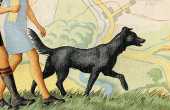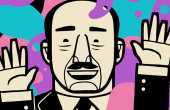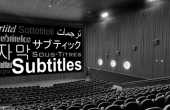Amyus
A passionate subtitler, bibliophile, self-confessed coffee addict, lover of European and Oriental Cinema, confirmed bachelor and wannabe blues guitarist
Correspondent I
- Plebian Penman
- Lurker
- Pssst
- Hand Raiser
- Vocal
- Outspoken
- Extrovert
- Sharp-Eyed Citizen
- Town Watch
- Detective Deskman
- Penman Patrol
- Article of the Month
- ?
- Articles
4 - Featured
4 - Comments
378
- Ext. Comments
162 - Processed
116 - Revisions
86
- Topics
15 - Topics Taken
0 - Notes
130
- Topics Proc.
167 - Topics Rev.
35
- Points
3530 - Rank
16 - Score
3040
Latest Articles
Latest Topics
The Appeal of Nonsense Literature: A Remedy for a Mad, Mad World?For many of us, our first exposure to nonsense literature in general came in the form of nonsense poetry. Authors such as Edward Lear, Lewis Carroll, Dr. Seuss and Spike Milligan used non-sensical verse to subvert the power of language to label and own the world. Oxford scholars now suggest the origins of nonsense literature may be found in the 11th century, although there is circumstantial evidence to suggest an even older origin, possibly as far back as Aristophanes. Nonsense poetry (and, by extension, nonsense literature in general) is now an officially recognised subset of the international language of literature, and elements have even crept into everyday usage. For instance, few people know that the oft-used word 'nerd' was invented by Dr. Suess. In addition to the names listed above, Ivor Cutler, James Joyce, Rudyard Kipling, Jorge Luis Borges, Samuel Beckett, Eugène Ionesco, François Rabelais, Flann O'Brien, Velimir Khlebnikov and Sukumar Ray (to name but a few) have all used either nonsense or nonsensical structure in their works, as have Bob Dylan, David Byrne (Talking Heads) and Syd Barret (Co-founder of Pink Floyd). Discuss how the anarchic power of nonsense writing can be liberating, both to the author/writer and to the reader/audience. Choose whatever examples you wish and show how, by breaking the established rules of grammar, punctuation and capitalisation, nonsense can also sometimes even act as a remedy for a mad, mad world.
|
Neo-Erotica or Blatant Pornography?Over the past decade or so there has been a none-too subtle incursion of what once would have been considered pornographic films, into mainstream cinema. Vincent Gallo's 'The Brown Bunny' (2003), Lars von Trier's 'Nymphomanic' (2013) and the recent 'A Thought of Ecstasy' (2017), directed by Rolf Peter Kahl, are three such examples. All feature scenes with, what is euphemistically referred to as, 'unsimulated sex'. Experimental cinema, avant-garde, neo-erotica – whatever label is applied, it seems that some mainstream actors and actresses are prepared to have their names attached to these projects and, in the case of 'Nymphomaniac', even have their faces and torsos superimposed over body doubles, although in the fallatio scene from 'The Brown Bunny' no doubles were used. Discuss whether 'unsimulated sex' in mainstream films can have any actual artistic merit, or is this just another way for controversial directors to circumvent censorship and so push their own sexual fantasies? In a world increasingly bent on instant gratification, are we being desensitised to accept without question the open exploitation of sex in mainstream as 'normal'? Where should the line be drawn?
|
The Male MuseA muse has traditionally, and generally, been seen as female. She may come from any walk of life and need not be a 'beauty' in the classical sense, for it that elusive, almost undefined quality that inspires the creative male mind – but what of the male muse inspiring female creativity? For the Mexican painter, Frida Khalo (1907-1954), her husband was her muse, despite their often turbulent relationship. More recently the American photographer, Sally Mann has spent over forty years photographing her husband going about his daily life. The Dutch artist, Rineka Dijkstra finds inspiration in photographing her son as he grows into a young man, whilst the British filmmaker, Sam Taylor-Johnson describes her husband, Aaron as both her muse and soulmate. Familial, romantic and/or sexual relationships aside – do creative women regard their male muses any differently from how creative males regard female muses? By extension – what does a creative woman look for in her male muse? By citing examples from history (both ancient and modern) examine how creative women have found and been inspired by their male muses.
|
What's in a Non-de-plume?A cursory glance at the names of contributors to The Artifice shows that many of us choose nom de plumes (pen names). My own pen name is a variant spelling of a character's name from an Agatha Christie novel, whilst other contributors have chosen pen names that either reflect their interests, their sense of humour or they serve as a personal statement. There are many reasons to use pen names. Some may be for political or cultural reasons. George Eliot (1819-1880), for example, was writing at a time when it was difficult for a female writer to be accepted simply as a writer and not be judged by her sex. Conversely, I recently met a male writer who writes romantic fiction under a female nom de plume; and very successfully too. Discuss how the invention of a 'literary double' might empower the writer and, just as importantly, have our nom de plumes become characters in their own right? |
A.I. and the Creative DriveRecently the DWANGO corporation (Japan) made a presentation to Hayao Miyazaki (co-founder of the Studio Ghibli anime house) to demonstrate its 'Deep Learning' programme, created to teach A.I. how to "draw like humans do," (Nobuo Kawakami, Chairman). The result was a hideous zombie like creature that propelled itself across the screen, using its head like a leg. "It looks like it's dancing," Kawakami joked. Miyazaki was disgusted, pointing out that an A.I. has no concept of pain and human suffering: "I strongly feel that this is an insult to life itself". Discuss whether the 'creative' output of what will eventually become autonomous A.I. will ever be able to match the natural creative drive of humans. Or will it forever merely mimic its creators? Could A.I. ever 'evolve' to the point at which it feels the subtle touch of the muse? After all, it is, quite often, those small imperfections in human creative expression that make art (in all its forms) unique and sensitive.
|
Published | Rebuilding The FutureThe year 1960 saw the release of George Pal's imaginative production of H.G.Wells' 'The Time Machine', considered by many to be a classic. At the end of the film, the main character 'George' returns to the distant future to help the newly liberated yet child-like Eloi build a new society, taking just three books with him to aid his venture. As his friend comments to another character '…which three would you have taken?'. Considering the wealth of knowledge we have access to in the 21st Century, which three books (factual or fiction) would you choose and, more importantly, why?
|
Drugs and the Creative Process'In Xanadu did Kubla Khan. A stately pleasure-dome decree…'. It's said that Samuel Taylor Coleridge composed his classic poem whilst under the influence of Laudanum (an alcoholic tincture of Opium). Similarly such great names as Bram Stoker, Charles Dickens, George Eliot, Dante Gabriel Rossetti, Percy Bysshe Shelley and Lord Byron had ongoing 'relationships' with the same. What was once considered acceptable behaviour amongst the creative is now legislated against, often for good reason, but many of us today start our daily routine with our drug of choice, i.e. coffee. Narcotics have had a profound influence on the creative mind across the centuries and will, no doubt, continue to do so in the future. Consider why the creative mind sometimes requires or even craves external stimulus and why we are frequently willing to ignore drug usage among the creative when enjoying the fruits of their labour.
|
A Black James BondDaniel Craig became the first 'blonde' Bond, but once his tenure comes to a close, a new face will be required to sip those Vodka martinis and put paid to the latest Mr Big's plans to dominate the world. When considering the many, fine black actors working these days, perhaps it's time that we had a black James Bond. After all, the CIA operative Felix Leiter was recast in the 2006 franchise reboot, with the excellent American actor Jeffrey Wright proving he was more than capable of handling a darker role (excuse the unintended pun). So, which black actor could become Bond and, more importantly, why? Bear in mind that it is the character of Bond that is the focus, so the choice of actor must be one who can both fills those shoes and yet be able to make that character his own. This is not a popularity contest. On a personal note – I would suggest Chiwetel Ejiofor ('Twelve Years a Slave'. 2013). He is the consummate professional who possesses a solid, on-screen (and stage) presence. His IMDB profile shows an impressive track record that demonstrates he can switch from comedic to dramatic roles with ease (just take a look at his performance in 'Kinky Boots'. 2005) and he is ruggedly handsome enough to raise respectful envy from male Bond fans whilst undoubtedly turning more than a few female fans' heads. Remember, James Bond is an iconic role so your choice and reasons must take this into consideration.
|
Latest Comments
| Subtitling for Cinema: A Brief History | |
John Davies. Thanks for your comments and my apologies for the tardiness of my reply. Yes, Deverson and Lampitt certainly left a wonderful legacy, something that just can’t be captured with an ‘app.’ You ask, ‘Do they still make good, useful and gently educational books like this today?.’ Good question and to be honest, I haven’t looked too deply into that aspect, but I do worry about the level of political correctness and ‘wokeness’ that seems to be invading educational entertainment for children in general. Where’s the sense of adventure and discovery we once had? Recently I’ve been looking at the old I-Spy children’s books again – yet another collectible series – and realised we, as children, had a great deal more freedom to explore and discover for ourselves. I’m pleased to read that you’re still using paper maps. You can never be out of reception range with a decent map. 🙂 | The Map That Came To Life: A Memento from Childhood |
A fascinating article and a good read. Perhaps the one important lesson we can all take from this article is that it’s high time some elements of humanity grew up and stopped behaving like schoolyard bullies. I have a dream… | Issues of Consent, Representation, and Exploitation in Deepfake Pornography |
A wonderful article and thanks for introducing me to a film that I need to watch. | Absences in Theo Angelopoulos' Landscape in the Mist |
‘Groundhog day cannot be topped though’ Take a look at the 2014 Australian sci-fi film, ‘Predestination,’ directed by the Spierig Brothers and starring Ethan Hawke and Sarah Snook. Now there’s a perfect time loop story! A temporal ‘agent’ is predestined to become his own mother and father, hence the title. It’s based on the short story “-All You Zombies-” written by Robert A. Heinlein, but has nothing to do with zombies. | How Time Loop Movies Have Avoided Their Own Groundhog Day |
An eye opening and though provoking piece. Thank you. | Historical Fiction: Understanding the Past Through Gould's Book of Fish and Wanting |
Mike Bailey. Thanks for your comment. I’ve really enjoyed reading comments from those like you who have been inspired by reading The Map That Came To Life. Whatever sparks a child’s imagination is worth revisiting as an adult. At times such as this, we should all be outside, getting as much fresh air andf sunlight as possible. | The Map That Came To Life: A Memento from Childhood |
Fantastic article! I loved it. Thanks for the read. | Roland Barthes: Love as a Language |




Your question is a little off-topic for subtitling, unless you wish to create a font or fonts for a particular subtitling project. Nevertheless, I have done a very quick search for you and there are numerous sites that can help. I don’t use Photoshop, so you may find what you’re looking for via one of these links:
https://www.creativebloq.com/how-to/add-fonts-in-photoshop
https://www.wikihow.com/Add-Fonts-to-Photoshop
Good luck